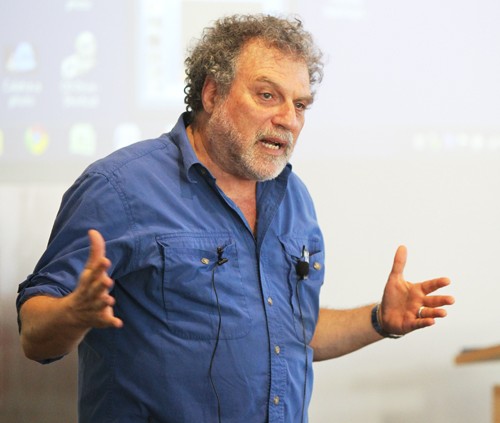This Monday marked the beginning of the 3rd annual celebration of the College of Humanities, one of the most diverse colleges on the UA campus.
“”The goal of Humanities Week is to engage the community at large, as well as students and staff, in what the Humanities are and what sorts of things our college has to offer,”” said Mary Wildner-Bassett, dean of the College of Humanities.
The goal is an ambitious one. The College of Humanities defies any simple definition.
According to its website, the college offers 32 degree programs and employs 140 faculty members. Departments within the college span cultures and languages, including Africana studies, German studies, Russian and Slavic studies, Spanish and Portuguese, East Asian studies, French and Italian, classics, English and creative writing, religious studies and the Critical Languages program, which includes an additional 21 foreign languages.
In the past two years, the celebration of Humanities Week has taken various forms, including community lectures, screenings and redecorating Heritage Hill as a garden of literary quotes. This year will also offer a diverse program of lectures, screenings and discussions that focus on myriad texts ranging from “”Paradise Lost,”” to the history of tango, to an emerging discipline called the digital humanities.
Digital humanities is a broad term that involves, among other things, digitizing print archives. “”We’re doing a lot of that at the Poetry Center right now, digitizing texts to make them searchable and accessible online,”” said Dean Wildner-Bassett. “”The term also includes learning games and social networking. Even Facebook is a text that connects people and the humanities. It’s literary and communicative.””
Several guest speakers will be in attendance this year, including Professor Martin Bresnick of the Yale School of Music and Olivier Barrot, a French journalist and writer who gave a lecture on the history of the Cannes Film Festival on Monday night. Getting guests to attend has not been a difficult process, says Dean Wildner-Bassett. “”So far, we don’t get turned down. Our guests understand the value of the humanities in general and our engagement with the campus and community.””
Spotlight on Milton Marathon:
Students will journey though John Milton’s epic poem, “”Paradise Lost,”” on Friday. From 8 a.m. to 8 p.m., students and the public will read from all 12 of the
poem’s books.
The idea of the marathon at the UA was born 13 years ago when John Ulreich, Ph.D., professor of English , saw information about other Milton marathons on the Milton listserv. After getting positive feedback, the event was organized and a tradition was born. “”Paradise Lost”” was read in the old Student Union each year until it was remodeled, after which the marathon was held in various classrooms until attendance grew too large. For the past six years, the marathon has been housed in the Main Library’s Special Collections room C205. Hundreds of people filter through the room during the marathon enjoying refreshments and poetry, according to Ulreich.
Some students opt to stay for the whole 12 hours. These participants receive Norton Critical Editions of “”Paradise Lost,”” which Ulreich says are “”cheerfully donated.””
Hackett Publishing, Penguin Books, Signet and Modern Library all sent copies of the poem that will be used as prizes, thanks to English major Steven Minas .
Some of these donated books will be given to students who made a video advertisement for the event. Their video can be viewed on the marathon’s website.
“”It’s fascinating to see these undergraduates … how intrigued they are with this poem,”” said Pat Brooks, director of external affairs in the College of Humanities about the event.
Last year, UA President Robert Shelton came and read. Shelton was the first president to attend the marathon.
“”I enjoyed my very minor contribution last year to the Milton Marathon. The portion of the readings I heard reminded me of my first efforts to read, comprehend and discuss ‘Paradise Lost’ when I was in high school. I think the event is an excellent reminder to all of us about the importance of great literature,”” Shelton said in an email.
Students don’t have to sign up to read, and many come just to listen.
“”One of my students one year said, ‘You know, Dr. Ulreich, there’s something in ‘Paradise Lost’ for everyone.’ I think that’s part of the secret. It’s a difficult poem to understand. Thirty years ago, I thought I understood it. I know better now.””
Last year, a Phoenix woman traveled to UA to attend the marathon for the 12th time, according to Ulreich.
“”It’s a place to come and enjoy poetry. The fact that ‘Paradise Lost’ was written 400 years ago doesn’t matter so much; the fact that it’s great poetry matters,”” Ulreich said. “”If you come and listen, there’s a good chance you’ll hear something that will matter to you.
If you come and read, which is great, then it’s even likelier that something will grab your imagination and start your thinking.””









